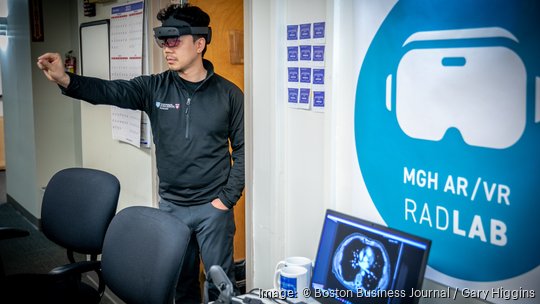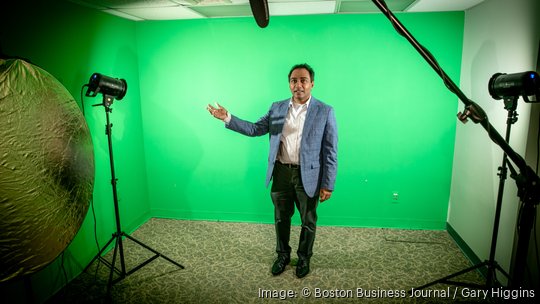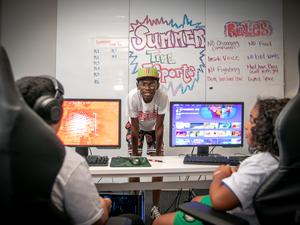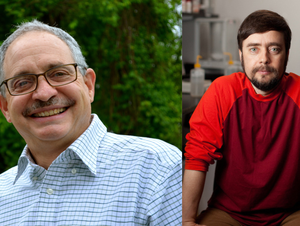
Virtual and augmented reality were once seen as the latest fad in gaming technology. But in recent years, better quality software and increasingly inexpensive hardware have made VR and AR appealing to other industries, including healthcare.
Virtual reality involves donning a headset and entering a three-dimensional, interactive world. Augmented reality is a less all-encompassing version of this technology that overlays computer-generated content on the real world.
Boston-area companies and hospitals are testing out how both technologies can enable at-home physical therapy, help patients de-stress in the hospital, train doctors and more. While the healthcare industry is notoriously slow to change, founders and doctors say they are hoping to prove that this virtual technology can have a real-world impact.
Changing the perception of VR
“Most of the people, if you ask, for them VR and AR is for gaming. They don’t even know it can help them and can help their health,” said Eran Orr, the CEO of XRHealth.
Orr’s Needham-based company is trying to change the narrative around VR and AR (known collectively as XR, or extended reality). XRHealth wants people to be able to access the same outpatient services typically seen in brick-and-mortar clinics in their own homes.
XRHealth is a software and content company that partners with headset manufacturers, Orr said. The company ships patients a VR headset which allows them to complete treatment programs designed and overseen by clinicians, with specialties including physical therapy, cognitive decline, stress and pain management. Orr said these treatments are typically covered by insurance as telehealth.
Orr said VR increases access to these outpatient services. He also said the use of VR allows clinicians to capture more data on patients than would be possible in a clinic. And patients enjoy the game-like experience.
For example, if a patient has an upper extremity rotator cuff injury, Orr said, he or she can be transported to a virtual circus, where, using hand controllers, they’re asked to use swords in each hand to pop balloons.
“While (the patient) is doing that, the clinician can actually monitor and evaluate their reaction time, their response time, the smoothness of the motion, the ability to reach to different types of places,” Orr said. “And for the patient, it’s just a fun and engaging experience.”

Entering the hospitals
Virtual reality is also being used by startups inside hospitals. XRHealth is selling its technology to hospitals and rehab centers for a variety of use cases, Orr said.
Meanwhile, a Wakefield startup, Rocket VR Health, is focused solely on serving patients in clinical settings, specifically creating mental health programs for patients undergoing operations with long hospital stays.
“There is a big need. Hospitals are very understaffed, and it’s really hard for them to provide these supplementary services when it comes to mental health,” said Nik Vassev, co-founder of Rocket VR Health.
Vassev said their software can be used for things like guiding patients through a meditation ahead of a procedure, or allowing them to experience a mock MRI scan.
Rocket VR Health is working with clinicians at Massachusetts General Hospital to develop and test a VR digital therapeutic for patients receiving a stem cell transplant. Vassev said the company plans to seek FDA clearance as a medical device.
“It’s such a new, nascent technology and healthcare organizations are very risk-averse. So, it’s really helpful to have solid data that backs what you do,” Vassev said.
While the FDA clearance is needed to make medical claims about the product, such as its ability to treat anxiety, depression or PTSD, there’s more leeway around using it to lower stress, which is not a clinical condition, Vassev said.
Vassev said he expects the use of VR and AR to ramp up quickly in healthcare.
“We’ll really see it in the next three to five years — hospitals really investing in VR, where this information is actually being used and actually much more engaging for patients,” Vassev said.
Doctors lead the charge
In 2020, Mass General launched its own AR/VR lab to test products for industry partners and develop their own extended reality technology, including immersive 360-degree videos allowing patients to experience new procedures and virtual simulations.
“I think the technology is there. The question is how imaginative we are to apply it in medicine and what will the hospitals allow us to do,” said Dr. Raul Uppot, co-founder and clinical director of the lab.
Through their testing at the lab, the team aims to show the potential benefits of treating patients and training medical staff with VR, including cost savings, faster procedures and improved patient safety.
The move to using VR in hospitals won’t be seamless. Dr. Min Lang, a radiology resident and co-founder and innovation director of AR/VR lab, said one of the challenges is the fast-changing hardware landscape. He said hospitals are concerned about the headsets being phased out by companies with whom they don’t have an established, long-term relationship.
Uppot said another one of the difficulties is combining the expertise from separate headset manufacturers, software startups and medical professionals into VR products.
Lang added that these challenges shouldn’t deter healthcare systems from embracing new innovations in extended reality. Instead, it should motivate them to get involved early and help guide its development.
“I think we should adopt a little bit more of a mindset of the tech sector in some ways,” Lang said. “We should be open to new ideas and testing them. Not every idea has to succeed. If it’s a failure, you learn from these failures and then the next technology will be better.”
Sign up for The Beat, BostInno’s free daily innovation newsletter from BostInno reporter Hannah Green. See past examples here.








